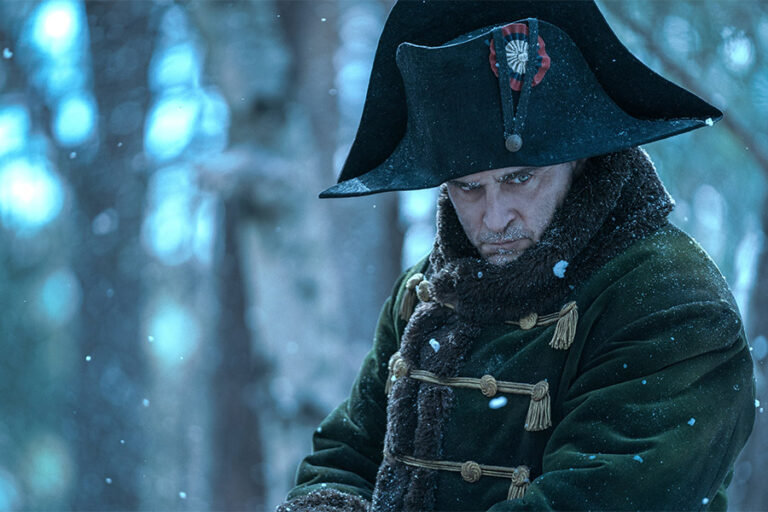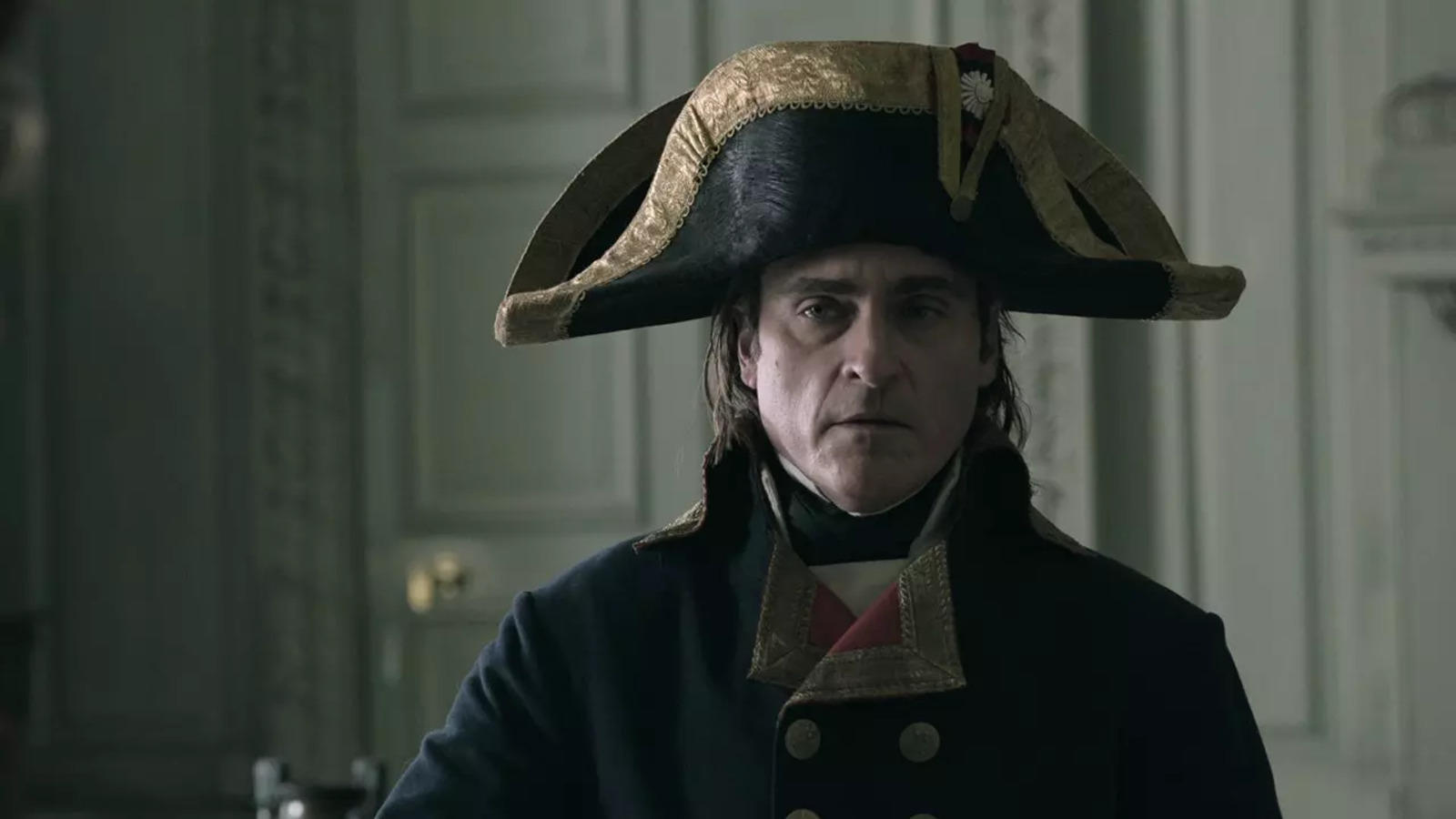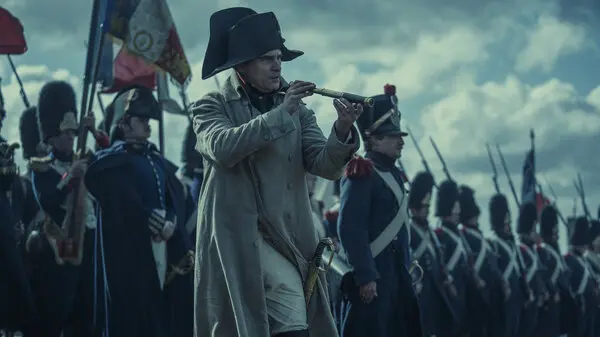But Was the Ridley Scott Film Napoleon Historically Accurate? Want to know the quick answer? The answer is a definite no. Napoleon was a beautiful film – just a mind-blowingly beautiful period piece. Nothing like it. But it was a movie without heart. Personally, I wanted to see this Napoleon catch a musket ball in the face. He was a horrible individual that was only interested in authoritarian/totalitarian based power. Absolute and complete power pointed directly at the temple of the French citizens. But is that how the real story played out? Let’s find out.
Personal thoughts on Ridley Scott’s Napoleon
There is no heart in this movie at all. Joaquin Phoenix’s Joker? Oscar magic. Joaquin Phoenix’s Theodore in Her? Fantastic. Joaquin Phoenix in Ari Aster’s Beau is Afraid – shifted the cinematic playing field. You Were Never Really Here was shockingly brilliant. Loved every moment. I mean, even his role in Gladiator was brilliant and demonically heart-filled. But Joaquin’s Napoleon? Nope. It’s just not there. But the most interesting bit here – is the way this movie went off the historical rails. You’ll see.
Quick Napoleon Movie Walkthrough and the Historical Inaccuracies
Napoleon, during the French Revolution, as an officer in the French army, watches as his Queen, Marie Antoinette is guillotined. (That did not happen. Napoleon was commanding forces at Toulon at the time – which was well over 500 miles away.) Later on that year, Paul Barras – the leader of the revolution – allows Napoleon to undergo the Siege of Toulon. (You already see this one. Timeline is incorrect.) Napoleon does lead a surprise attack on the city and he was able to successfully push back the British navy from the city’s ramparts. So, yay historical accuracy… for once! hahah.
Afterward, Robespierre is captured and executed as France concludes the Reign of Terror. The new guard of leadership in France – which included Napoleon – attempted to stabilize the country by once again utilizing overwhelming force. Napoleon was able to put down the royalist insurrection.
A Deeper Dive into the Life of Joséphine
She was born Marie-Josephe-Rose de la Pagerie in 1763, into a family of indolent and impoverished sugar growers and slave owners who valued their connections to the French aristocracy. At the age of 15, after little formal education, she traveled to France for an arranged marriage with 17-year-old Viscount Alexandre de Beauharnais. The union was a disaster from the start; Alexandre had a much older mistress to whom he was devoted, and soon dispatched his young wife to a convent. Nevertheless, she had two children by him in the first three years of the marriage, both normal pregnancies and births. Soon after the second birth, fed up with her husband’s errant ways and clearly growing more savvy with the world, she found herself a lawyer and arranged a separation that gave her an income and a comfortable life, probably with the attention of several lovers.
All this changed with the arrival of the Revolution in 1789. Alexandre was initially a supporter, one of those who met at Versailles in June 1789 and established the first National Assembly. He rejoined the army and took part in campaigns against Austria and Prussia. However, by 1793, after being accused of having poorly defended Mainz during the siege in 1793, he was arrested as an aristocratic suspect. Thereby attracting the displeasure of Robespierre, he was led to the guillotine. Josephine was also incarcerated in the same prison as her ex, but five days after Alexandre’s execution, the Reign of Terror ended. We also know that, during this time, Josephine had a short liaison with General Lazare Hoche.
Post revolution, Josephine needed to figure out how to provide for herself in this newly upside down world. In 1795, the Directory replaced the Convention (which had replaced the National Assembly); through a friend, Josephine met Paul Barras, the most powerful of the Directors, and soon became his mistress. And it was in 1795, at a dinner she hosted in Barras’ house, she met Napoleon Bonaparte. She was 32, he 26.

Let Us Continue the Movie Narrative
Joséphine de Beauharnais, a widow, is wooed by Napoleon, and the duo marry. But despite their attempts, they aren’t able to have any children. Soon after, the film shows Napoleon’s army winning again at the Battle of the Pyramids in the year 1798… (But obviously Napoleon didn’t have his troops fire on the pyramids – and it continues the myth, in a way, that Napoleon blew off the nose of the Sphinx. Instead, Napoleon utilized the pyramids and the Sphinx as items to esteem and honor. In actuality, Napoleon utilized this ancient items as motivators for his troops. Ridley Scott defended the decision to depict the military leader taking pot shots at the landmarks by saying that it was a quick way to show that Napoleon won the battle.)
Napoleon rushes home when he hears Joséphine has been carrying on an affair with Hippolyte Charles. (Also a hard no – Napoleon didn’t flee Egypt after finding out about Josephine’s affairs, he retreated from Egypt because of supply lines collapsing. If you can’t keep your army supplied, in the world of military conquest… you are toast.) Back in Paris, the Directory ridicules him for abandoning his troops, and he counters by challenging them and their poor fiscal leadership. Napoleon then leads a coup, and takes over the country militarily in a coup – becoming First Consul.
Napoleon does become crowned Emperor of France by the Pope in 1804 – wherein he famously puts the crown on his own head. Talleyrand, Napoleon’s Foreign Minister, attempts to pull together an Austrian alliance – which the Austrians dismiss. One year later, Napoleon routs the Russians and Austrians at the Battle of Austerlitz. When his enemies retreat over frozen lakes, Napoleon orders the cannon-balling of the ice, thereby drowning them. (This rumor of the ambush was widely doubted since the time of the actual battle. We should also pause and say that Napoleon was an artillery commander, and he never personally led a cavalry charge in his entire life. So, throw that onto the pile of ahistorical additions. It may be that these charges were based on Napoleon’s numerous famous paintings wherein we see him mounted upon a horse – which, in turn, may have come from his rallying his reserves in Eylau. But I digress.) After the battle, Napoleon invited Tsar Alexander I and the Austrian Emperor to meet – which Alexander declined – wherein he informed Francis that he should be happy he didn’t totally destroy their armies.
In the film, Napoleon’s mother devises a pretty crazy fertility test for her son… he impregnates a mistress solely proving that Joséphine is infertile. What mother hasn’t suggested just such a test for her son? (I mean, we can’t prove what the Royal mother was thinking at this moment. Sure, it was probably understood he was having affairs, but wouldn’t it be more likely for the thought to come to everyone after the fact? As opposed to a premeditated (and therefore morally repugnant) forethought?) And as a result, Napoleon divorces his wife in 1810. (Actually he divorced in 1809, prior to Napoleon’s meeting Tsar Alexander.) During the divorce, he publicly slaps her in the face when she initially refuses to read her portion of the decree, but afterward the two remain on good terms and continue exchanging friendly letters. (Napoleon definitely did not ever lay a hand on Josephine – and it would have been extraordinarily out of step with his character if he had. Also, Josephine was terrified of being divorced – and she did not encourage Napoleon to divorce her in order to birth an heir to the throne.) Napoleon marries Marie Louise of Austria, who bears a son one year later.
Famously, in 1812, Napoleon invades Russia after Alexander breaks a peace treaty between the two countries. The fighting is really bloody, including guerrilla type attacks on behalf of the Cossack’s at Borodino. But when Napoleon’s forces arrive in Moscow, they find the city deserted. When the winter arrives, Napoleon realizes that after having lost 500,000 men, they were not in a good position to hold the advantage. Then, when the Coalition forces his abdication, he is exiled to Elba.
In 1815, upon hearing that Joséphine is unwell, Napoleon escapes the island and returns to power in France. (No, Josephine died the day before Napoleon was exiled to Elba, so she couldn’t have been Napoleon’s reason for escaping.) She, having been forced into reclusion at the Château de Malmaison, dies before he arrives (romantically cute, but false). King Louis XVIII sends the Fifth Regiment to stop Napoleon, but he charms them into joining him.
Then at the infamous Battle of Waterloo, Napoleon faces his arch rivalry, the British, lead by the Duke of Wellington. (Oh, and whom Napoleon never met.) When Napoleon sends his French cavalry, they are repulsed by the British infantry squares. Really desperate for ideas, Napoleon pushes his soldiers into an unwise advance. And ultimately, these advances are destroyed by the the quickly reformed lines of the British infantry men. Prussia’s forces arrive in order to reinforce Wellington, and as a result the French are decimated. This time, Napoleon is exiled to the escape proof Saint Helena – which is way the heck out in the middle of the Atlantic ocean… Where he writes his memoirs. And like this movie, his memoirs are clearly biased towards his own side of the story.
As the movie fades to black, it is noted that well over 3 million people died in his attempts at military conquest.
Ridley’s Response to His Film’s Historical Inaccuracies
What was Ridley’s response to the criticism that his film was historically inaccurate? Good question my dear random internet visitor. Welp. In a word, not well. “Napoleon dies then, ten years later, someone writes a book. Then someone takes that book and writes another, and so, 400 years later, there’s a lot of imagination [in history books]. When I have issues with historians, I ask: ‘Excuse me, mate, were you there? No? Well, shut the fuck up then.'” Scott also declared, responding to French critics, that “the French don’t even like themselves.” So, I’m guessing Mr. Scott won’t take too well to yet another take down to his historical inaccuracies.
My Personal Thoughts on the Film
Worse than the inaccuracies was the film’s lack of heart, or thread. Ridley tried to make the love story between Napoleon and Joséphine the through-line, but almost all of that emotional connection was false. So, yeah, no thanks. But from a cinematography standpoint it was a stellar film. Gorgeously represented in every way. It was incredibly well acted. But when there is no emotional mooring to hold the actor’s efforts together, it really doesn’t matter.
Edited by: CY



